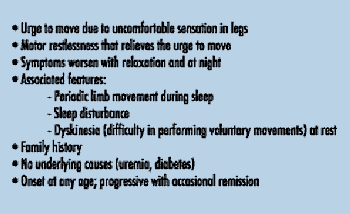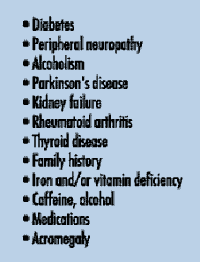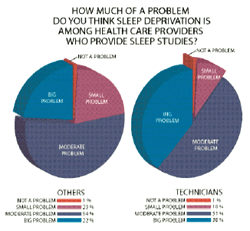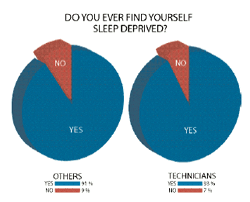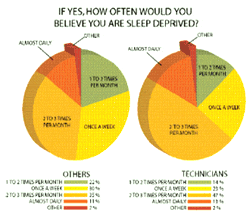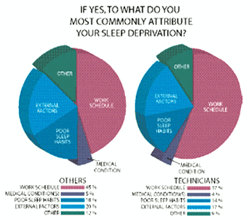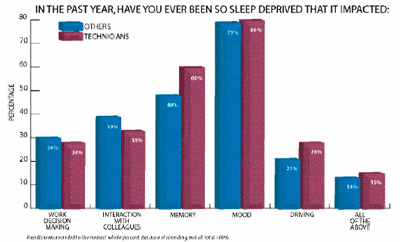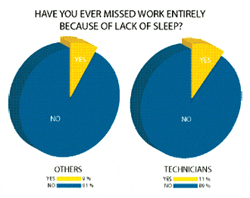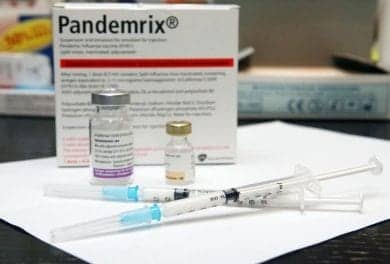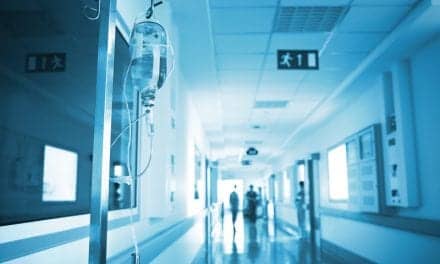A Sleep Review survey reveals that lack of sleep is also common among those who test for and treat sleep disorders.
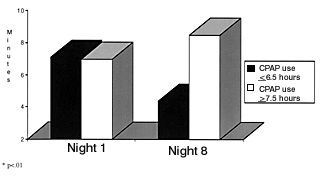
However, what we do not see is the dedicated sleep technicians who stayed up all night long watching Joe sleep and monitoring his test results to assure accuracy. There is almost never a discussion about how sleep deprived they could be.
Back in December, the editor of Sleep Review magazine e-mailed me for ideas on sleep deprivation articles and I said, “Well, what about the techs?” I knew that during my short stint as a technologist—although I thought my body adjusted nicely to the new time change—I was surely sleep deprived.
Together we looked and found that the topic had been addressed by Mark R. Rosekind, PhD, John N. Boyd, PhD, and William C. Dement, MD, PhD, in the spring 2001 issue of Sleep Review, as well as at some sleep medicine conferences. However, no one that we could find had done a recent survey among technicians. Thus, we developed a survey idea to add a little more information to discussions of the problem and hopefully inspire others to do a more clinical study of this important issue.
Methods
To gather our data, we e-mailed 9,266 subscribers of Sleep Review and asked them to go to our Web site to fill out a 15-question survey. After 2 weeks, 769 had completed the online survey. Among those who responded, 482, or 63.68% of the total 769, identified themselves as sleep or respiratory technologists (RRTs, RTs, RPSGTs, PSGTs, etc). Of the remaining 287, nearly half (43.55%) were doctors (MDs, PhDs, and DDSs), 6.27% identified themselves as support personnel, 27.87% marked that they were administrators, and 22.3% checked the “other” box or skipped the question.
Since the majority were technicians, we decided to focus on their results in this article and compare them to all the other job titles as a group.
Results
It should be first noted that no formal statistical analysis was performed on these data. Again the point of this article is simply to report the survey results and not to make formal conclusions.
We found that sleep technologists (average age 42.5) tended to be younger than other sleep medicine professionals who filled out the survey (mean age 47). The second thing we noticed about the technologists was that they reported working longer hours than the other sleep medicine professionals. Whereas only about one in 10 of the non-technologists reported working 12-hour shifts and 9.76% worked more than 12 hours per day, for technologists a full 31.95% worked 12-hour shifts and another 19.29% worked more than 12 hours.
Getting little sleep was common to all sleep medicine professionals, but especially for technicians. Around one third (34.85%) of technicians and one fifth (21.25%) of nontechnician sleep medicine professionals reported sleeping only 4 to 6 hours out of every 24.
In addition, almost all sleep medicine professionals reported occasionally being sleep deprived. For technicians, it was 92.95% and for others it was 90.94%. However, technicians were more frequently sleep deprived; 46.58% of technicians compared to 34.85% of other sleep medicine professionals said they were sleep deprived two or three times per week and 13.24% of technicians compared to 10.98% of others said they were sleep deprived almost daily.
Technicians were also slightly more likely to attribute their sleep deprivation to their work schedule. More than half (56.7%) said it was a cause compared to only 44.91% for nontechnicians. Other sleep professionals were more likely than technicians to name poor sleep habits, medical conditions, and external factors as the main cause of their sleep deprivation.
Sleep technicians reported in roughly the same numbers as non-sleep technicians that, in the past year, sleep deprivation had affected their decision-making, their interaction with colleagues, and their mood. However, they were more likely than non-sleep technicians to report that it had affected their mood and their driving. On the positive side, they were less likely than non-sleep technicians to have been late to work because of a lack of sleep and about as likely as other sleep professionals to have missed work entirely because of lack of sleep.
Finally, when it came to what resources were available to combat sleep deprivation among sleep medicine professionals, more than half, for both groups, said that employers did not provide information on sleep deprivation or strategies for better sleep to employees.
Discussion
These data are quite interesting in many ways. First, it was interesting to me that sleep technologists reported working 12-hour shifts and other sleep medicine professionals were less likely to report these long hours. My guess would be that the variance reported here is more likely a product of other sleep medicine professionals not working formal shifts as it were, but were probably still working just as many hours. In either case, both technicians and nontechnicians far outpaced the general population in the 2005 National Sleep Foundation (NSF) survey where the mean hours worked per week was 42.3, or just a little over 8 hours per day.
Next we see that about one third of sleep technologists are reporting getting between 4 and 6 hours of sleep. Anecdotally, I know this to be true and this survey is beginning to confirm my suspicions. This is simply not healthy and we already know all of the reasons why. Both groups also slept less than the general population. In the NSF’s 2005 survey, 10% of the general population slept less than 6 hours on weekends and 16% slept less than 6 hours on weekdays.
 |
 |
 |
 |
 |
 |
This is concerning but not surprising considering the results of previous studies on all types of shiftworkers. According to the NSF’s 2000 poll (which included a section specifically on people who work shifts), shift workers, on average, get less sleep during the week (6 hours and 30 minutes) compared to regular day workers (6 hours and 54 minutes). What is surprising is that despite, in theory, being surrounded by information about sleep at work, a third of technicians still report getting less sleep than the national average for all types of shiftworkers.
Third, it looks like many of us, at the very least, recognize that we are sleep deprived. Almost everyone in our field seems to identify with being sleep deprived, and the numbers get smaller as the amount of specific deprivation increases (from a general question to 2-3 times per week, to daily). This is an encouraging piece of information to me in that recognition of sleep deprivation is certainly one of the greatest clinical struggles we see in the field. However, what was less encouraging was that more than half of all those surveyed think that their deprivation is due to their work. This makes me think the blame has been shifted to the job and away from the individual. Even when working long shifts, there are another 12 to 14 hours left in the day for people to find their 6 to 8 hours of needed rest. Here we could be seeing that denial of personal responsibility can be a possible factor in a technician’s sleep deprivation. However, credence must also be given to the idea that a technologist’s shift is usually in the middle of a person’s natural timing and drive for sleep.
Speaking of driving, we see from these data that technologists’ mood and driving, at least in their minds, are affected by their sleep deprivation. What does this mean for the safety of our technologists and patients? In addition, since we know that the true customer service aspect of our business lives and dies with the technologist-patient interaction, I wonder how sleep deprivation could be affecting our service and, by extension, sleep medicine’s reputation in society?
The final point is the most disturbing in that few who were surveyed felt as though there were resources available to them to help with this situation, and the kicker to me is that the vast majority of the people who responded to the survey work in sleep laboratories or sleep centers. To me, this begs the question: Why have we, as a discipline, not put together a formal training program and a formal treatment program for our own technologists in all sleep centers?
Conclusion
The results of this survey have shed new light on several areas important to the health of sleep technologists and other sleep professionals. I hope that these data help researchers begin to ask questions about the sleep deprivation inherent in our field. With the answers to these questions, we can begin to develop programs for our centers and laboratories to ensure better sleep practices for not just our patients, but also ourselves.
Michael J. Breus, PhD, is a diplomate of the American Board of Sleep Medicine and the cofounder of the Sleep Center Management Institute, SVP Clinical Operations Phoenix Sleep, in Phoenix, Ariz, as well as a member of the Sleep Review editorial advisory board. Sleep Review Editor Lena Kauffman conducted the survey and assisted with this article.

